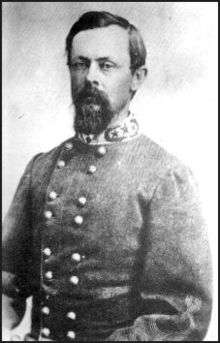Johnson Hagood (governor)
| Johnson Hagood | |
|---|---|
 | |
| 80th Governor of South Carolina | |
|
In office December 1, 1880 – July 10, 1882 | |
| Lieutenant | John D. Kennedy |
| Preceded by | Thomas Bothwell Jeter |
| Succeeded by | Hugh Smith Thompson |
| 20th Comptroller General of South Carolina | |
|
In office December 14, 1876 – December 1, 1880 | |
| Governor |
Wade Hampton III William Dunlap Simpson Thomas Bothwell Jeter |
| Preceded by | Thomas C. Dunn |
| Succeeded by | John C. Coit |
| Personal details | |
| Born |
Johnson Hagood February 21, 1829 Barnwell, South Carolina |
| Died |
January 4, 1898 (aged 68) Barnwell, South Carolina |
| Political party | Democratic Party |
| Spouse(s) | Eloise B. Butler |
| Alma mater | The Citadel |
| Profession | Planter, soldier, politician |
| Military service | |
| Allegiance |
|
| Service/branch |
|
| Years of service | 1861–1865 |
| Rank |
|
| Unit | 1st South Carolina Infantry |
| Battles/wars | |
Johnson Hagood (February 21, 1829 – January 4, 1898) was a brigadier general in the Confederate States Army during the American Civil War and the 80th Governor of South Carolina from 1880 to 1882.
Early years
Born in Barnwell, South Carolina, Hagood attended Richmond Academy in Augusta, Georgia, and afterwards graduated at the top of his class from the South Carolina Military Academy (now The Citadel) in 1847. He was admitted to the bar in 1850, but never practiced law because he preferred life on the plantation.
Civil War
When the Civil War broke out in 1861, Hagood volunteered and was enlisted a private of the First South Carolina Volunteers. He demonstrated remarkable skills in the military arts and rose rapidly through the ranks of the enlisted and subsequently as an officer. By 1862, due to his bravery in the field and considerable administrative acumen in camp, he was appointed a brigadier general and assistant adjutant general of the South Carolina Militia. His first commission in the Confederate States Army was as a colonel in the 1st (Hagood's) South Carolina Infantry. He participated in the Battle of Fort Sumter and the Second Battle of Bull Run, receiving appointment to brigadier general, effective July 21, 1862.[1]
During the 1864 Overland Campaign, Hagood brought a brigade north to Petersburg, Virginia, and fought under Major General Robert F. Hoke in the battles of Drewry's Bluff and Cold Harbor. He and his men served in the entrenchments at the Siege of Petersburg until December 1864, when Hoke's Division was ordered to the relief of Fort Fisher. Hagood commanded Fort Anderson during the Battle of Wilmington.
Actions during the Civil War and beliefs on race
After defeating Robert Gould Shaw and the black 54th Regiment at the second Battle of Fort Wagner, commanding Confederate General Johnson Hagood returned the bodies of the other Union officers who had died, but left Shaw's in a mass grave with his black soldiers, using the logic of most Confederate officers that the African American soldiers were fugitive slaves and that the attack on the fort was a slave revolt led by Shaw. Hagood informed a captured Union surgeon that ordinarily his body would have been released for burial, but as was the case, "We buried him with his niggers."[2]
At the end of the war, Hagood's troops served under General Joseph E. Johnston in North Carolina, and he may have surrendered with him at Durham Station in April, 1865, although Hagood's Brigade was commanded by its senior colonel at the time[3] and no record of his parole has ever been found.[4]
Postbellum career
After the war, Hagood resumed planting, but became incensed by the administration of Radical Republicans during Reconstruction. He actively campaigned for fellow Confederate general Wade Hampton in the 1876 gubernatorial contest and himself was elected on the Democratic state ticket as Comptroller General. He served a term until 1880 when he was nominated by the state Democrats for Governor. Hagood easily won the gubernatorial election that fall and his major achievement in office was the reopening of The Citadel in 1882.
Hagood died in Barnwell on January 4, 1898 and was buried at Church of the Holy Apostles Episcopal cemetery. For his loyalty and commitment to The Citadel, Johnson Hagood Stadium was named in his honor. Hagood, South Carolina is named for him, as well as several streets throughout South Carolina.
See also
Notes
References
- Bradley, Mark L., This Astounding Close: The Road to Bennett Place, University of North Carolina Press, 2006, ISBN 0-8078-5701-7.
- Eicher, John H., and David J. Eicher, Civil War High Commands. Stanford: Stanford University Press, 2001. ISBN 978-0-8047-3641-1.
- Sifakis, Stewart. Who Was Who in the Civil War. New York: Facts On File, 1988. ISBN 978-0-8160-1055-4.
- Warner, Ezra J. Generals in Gray: Lives of the Confederate Commanders. Baton Rouge: Louisiana State University Press, 1959. ISBN 978-0-8071-0823-9.
External links
- SCIway Biography of Johnson Hagood
- NGA Biography of Johnson Hagood
- The Citadel Archives, Hagood, Johnson, 1829-1898
| Political offices | ||
|---|---|---|
| Preceded by Thomas Bothwell Jeter |
Governor of South Carolina 1880–1882 |
Succeeded by Hugh Smith Thompson |
